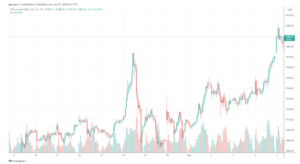
Cryptocurrencies and online betting have recently emerged as significant players in Turkey’s economy, with both industries seeing significant growth in recent years. While these industries have brought new opportunities and increased economic activity in the country, they have also raised concerns about their potential impact on the economy and society. In this article, we will explore how cryptocurrencies and online betting have affected Turkey’s economy, the challenges and opportunities they present, and the government’s regulatory approaches.
Cryptocurrencies in Turkey
Online betting in Turkey has seen significant growth in recent years, driven by the increasing availability of high-speed internet and mobile devices, as well as the popularity of sports and the desire for entertainment options during the COVID-19 pandemic. According to the Turkish Statistical Institute, the online betting industry generated over $1 billion in revenue in 2020, making it a significant contributor to the economy. The industry has also created new job opportunities and attracted foreign investment. However, the rapid growth of the online betting industry has also raised concerns about its potential impact on society, leading to calls for regulatory measures to ensure it is used in a safe and transparent manner.
The growth of the cryptocurrency industry in Turkey has brought both opportunities and challenges. On the one hand, it has provided an alternative financial system that is not controlled by the government or traditional financial institutions, offering more freedom and choice for individuals and businesses. It has also created new job opportunities and contributed to economic growth.
On the other hand, the lack of regulation in the cryptocurrency industry has raised concerns about its potential impact on the economy. There have been instances of fraud and money laundering, and the volatility of cryptocurrencies has made them a risky investment. In addition, the use of cryptocurrencies for illegal activities, such as tax evasion and drug trafficking, has raised concerns about their potential impact on society.
ADVERTISEMENT
Regulatory approach to cryptocurrencies
In response to these concerns, the Turkish government has taken a cautious approach to regulating the cryptocurrency industry. While it has not banned the use of cryptocurrencies, it has introduced some regulations to ensure that they are used in a safe and transparent manner.
In 2020, the government introduced a new regulation requiring cryptocurrency exchanges to register with the Financial Crimes Investigation Board (MASAK) and comply with anti-money laundering and counter-terrorism financing regulations. The regulation also requires exchanges to keep records of their transactions and report any suspicious activity to MASAK.
In addition, the Central Bank of Turkey has issued warnings about the risks of investing in cryptocurrencies, stating that they are not backed by any physical assets and their value is highly volatile. The bank has also cautioned against using cryptocurrencies as a means of payment, as they are not regulated and may not be accepted by merchants.
Online betting in Turkey
Online betting, including sports betting and online casinos, has also seen significant growth in Turkey in recent years. The industry has been driven by the increasing availability of high-speed internet and mobile devices, as well as the popularity of sports and the desire for entertainment options during the COVID-19 pandemic.
According to the Turkish Statistical Institute, the online betting industry generated over $1 billion in revenue in 2020, making it a significant contributor to the economy. The industry has also created new job opportunities and attracted foreign investment.
ADVERTISEMENT
However, the rapid growth of the online betting industry has also raised concerns about its potential impact on society. There have been instances of gambling addiction and financial problems among individuals, and there are concerns about the potential for money laundering and other illegal activities.
Regulatory approach to online betting
In response to these concerns, the Turkish government has taken a more restrictive approach to regulating the online betting industry. In 2018, it introduced a new law that imposed stricter controls on the industry, including limiting the types of games that could be offered and requiring operators to obtain a license from the Ministry of Youth and Sports. The law also imposed higher taxes on operators and required them to contribute a percentage of their revenue to support social and sporting activities.
Conclusion
Cryptocurrencies and online betting have emerged as significant players in Turkey’s economy, bringing new opportunities and increased economic activity. However, they have also raised concerns about their potential impact on the economy and society, leading to calls for regulatory measures to ensure they are used in a safe and transparent manner. While the Turkish government has introduced some regulations in these areas, the rapid pace of change in these industries has made it difficult to effectively regulate them. As these industries continue to evolve, it will be important for the government to find the right balance between promoting innovation and protecting the interests of consumers and society as a whole
DC Forecasts is a leader in many crypto news categories, striving for the highest journalistic standards and abiding by a strict set of editorial policies. If you are interested to offer your expertise or contribute to our news website, feel free to contact us at [email protected]
- SEO Powered Content & PR Distribution. Get Amplified Today.
- Platoblockchain. Web3 Metaverse Intelligence. Knowledge Amplified. Access Here.
- Source: https://www.dcforecasts.com/press-releases/how-crypto-betting-affect-turkeys-economy/
- $1 billion
- 10
- 2018
- 2020
- a
- About
- According
- activities
- activity
- addiction
- addition
- affect
- against
- alternative
- among
- and
- anti-money laundering
- approach
- approaches
- areas
- article
- Assets
- attracted
- availability
- backed
- Balance
- Bank
- banned
- Betting
- between
- Billion
- board
- Bringing
- brought
- businesses
- Calls
- Casinos
- categories
- cautious
- central
- Central Bank
- challenges
- change
- choice
- Concerns
- Consumers
- contact
- continue
- contribute
- contributed
- contributor
- controlled
- controls
- could
- country
- COVID-19
- COVID-19 pandemic
- created
- Crimes
- crypto
- Crypto News
- cryptocurrencies
- cryptocurrency
- Cryptocurrency Exchanges
- Cryptocurrency Industry
- Devices
- difficult
- driven
- drug
- during
- Economic
- Economic growth
- economy
- Editorial
- effectively
- emerged
- ensure
- Entertainment
- evolve
- Exchanges
- expertise
- explore
- financial
- Financial institutions
- financial system
- financing
- Find
- foreign
- foreign investment
- fraud
- Free
- Freedom
- from
- Gambling
- Games
- generated
- Government
- Growth
- higher
- highest
- highly
- How
- However
- HTTPS
- Illegal
- Impact
- important
- imposed
- in
- Including
- increased
- increasing
- individuals
- industries
- industry
- Innovation
- Institute
- institutions
- interested
- interests
- Internet
- introduced
- investigation
- investing
- investment
- Issued
- IT
- Job
- Job Opportunities
- Keep
- Laundering
- Law
- leader
- leading
- License
- made
- Making
- manner
- many
- means
- measures
- Merchants
- ministry
- Mobile
- mobile devices
- money
- Money Laundering
- more
- New
- news
- offer
- offered
- offering
- ONE
- online
- online casinos
- operators
- opportunities
- Options
- Other
- Pace
- pandemic
- payment
- percentage
- physical
- plato
- Plato Data Intelligence
- PlatoData
- players
- policies
- popularity
- potential
- present
- problems
- promoting
- protected
- protecting
- provided
- raised
- rapid
- recent
- recently
- records
- register
- Regulate
- regulated
- Regulation
- regulations
- regulatory
- report
- required
- requires
- response
- Restrictive
- revenue
- risks
- Risky
- safe
- seeing
- set
- significant
- Social
- Society
- some
- Sports
- Sports Betting
- standards
- statistical
- strict
- stricter
- such
- support
- suspicious
- system
- tax
- Tax Evasion
- Taxes
- The
- the Law
- their
- to
- traditional
- trafficking
- Transactions
- transparent
- Turkey
- Turkish
- types
- us
- use
- value
- volatile
- Volatility
- Website
- while
- will
- years
- Your
- youth
- zephyrnet













